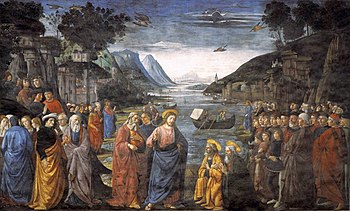I
don’t know Dr. Karoline Lewis personally, but I must say I really appreciate
her ministry—even though she shames me as often as she inspires me. The
Reverend Dr. Lewis is a professor of homiletics (that means preaching in “church speak”) at Luther
Theological Seminary in St. Paul, Minnesota. She is also a regular contributor
to the “Working Preacher” website, one of the sites where I go to borrow ideas
for my Sunday sermons.
What
I appreciate about Dr. Lewis’ approach to preaching is her insistence that the
gospel text itself will always provide all the relevance needed to feed the
hearts of those in the Christian assembly and prepare them for the further
adventure of being human beings living in Christ. Whenever I get the urge to
indulge my show-biz vanity and adorn my sermons with pithy anecdotes or rely on
my celebrated skills as a raconteur, I suddenly get a mental image of this
brilliant red-haired academic lady wagging a scolding finger at me and saying,
“Cut the crap, Owen, and give the people the gospel!”
There
is a saying that if you change the way you look at things, the things you look
at will change. Dr. Lewis has made me change the way I look at what I have
heretofore considered the punishment inflicted on preachers by the compilers of
the Revised Common Lectionary—those five consecutive weeks in Year B dealing
with Jesus as the “Bread of Life.” I used to think, “Okay. Just how much can
you say about bread?” I also considered these lessons, coming as they do in the
height of summer, provided a good excuse to go on vacation and let someone else
preach on bread. But Karoline Lewis, in a very thoughtful “Working Preacher”
post, has suggested that just maybe
the compilers of the RCL actually knew what they were doing when they stuck us
in the sixth chapter of John’s gospel for five weeks. Maybe we should really
take some extended time to absorb this message.
Just
what the heck does “Bread of Life” actually mean, anyway? For Martin Luther, in
his explanation to the fourth petition of the Lord’s Prayer, “bread” is “Everything
included in the necessities and nourishment for our bodies, such as food,
drink, clothing, shoes, house, farm, fields, livestock, money, property, an
upright spouse, upright children, upright members of the household, upright and
faithful rulers, good government, good weather, peace, health, decency, honor,
good friends, faithful neighbors, and the like.” (Small Catechism)
So,
okay, Dr. Luther. I’ll accept this symbolism and think of Jesus as the
necessity and nourishment of my existence. This would mean that I can’t get
along without Christ any more than I can exist without the other good things
catalogued here. I guess it’s up to me to cultivate a correct and respectful
attitude about this “bread” which, clearly, the characters in our gospel lesson
don’t have. I may not know how to relate to Jesus as the bread of life, but the
gospel points out how not to do it.
I
get a kick out of the way John tells this story (vv.26-7). The crowd pestering
Jesus greets him with a smarmy and disingenuous, “Rabbi! When did you come
here?” when they knew all the time that Jesus was on his way and they were lying
in wait for him to hit him up for more goodies. Jesus calls them on their B.S.
right away. Maybe he’s also calling us on ours too, you think?
Do
we want Jesus—or find him necessary—only when we feel we are deprived and
wanting? Is he our counselor for our time of trouble and not our guide in peace
and prosperity? Is he only as good as the last favor we attribute to him? (v.
30)
To
the credit of the crowd in our story, they do
ask Jesus how they can perform the works of God (v. 28), but we are a little
suspicious of their motives. Is this a genuine desire for a relationship with
God or a superstitious plea for prosperity? Do they believe discipleship is the
key to earthly success, like some happy-clappy TV evangelist who promises, “Follow
Jesus and you’ll be as stinkin’ rich as I am?”
No.
There has to be more than this. This “bread” is what gives our life meaning and
identity. It is necessity and nourishment. It is daily living, breathing, eating,
drinking, waking, and sleeping belief in God’s presence, love, and grace. It is
seeking Christ in every circumstance
and being fed by the search with the peace that passes our understanding.
So
thank you, Dr. Lewis, for changing my attitude and asking me to take a deeper
and less jaundiced look at these gospel lessons. I may not be able to glean everything
out of them (or even the most obvious messages), but I welcome the challenge.
Thanks
for reading, my friends. Hey! Check out Dr. Lewis’ post on preaching this series by clicking here.



